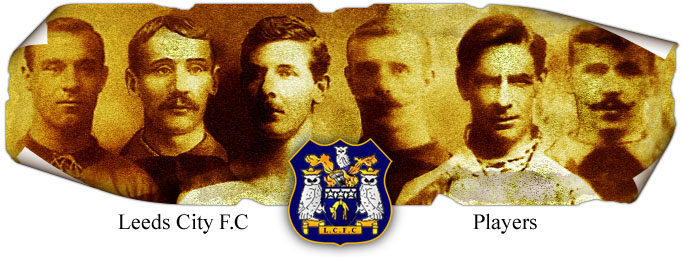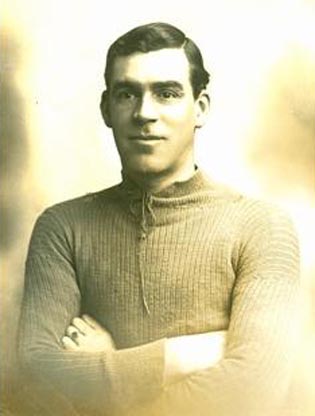

Scott: William Edward (Billy)
1912-1914 (Leeds City Player Details)
Goalkeeper
Born: Belfast: 17-05-1882
Debut: v Fulham (a): 07-09-1912
5’11 1/2” 12st 11lb (1912)
Scott started with Cliftonville, before signing for Linfield in August 1901. Scott went
on to represent the Irish League three times in Inter-League games and gained six
International caps while at Linfield. In his second international outing in March 1903 Scott
was part of the Irish team that defeated Scotland for the first time. After a jittery start
to the match he put in a performance which combined luck and fine judgement to keep a
clean-sheet in a 2-0 win. He remained Ireland’s regular custodian for a decade in which time
another win over Scotland and a first win over England were recorded. During his twenty-five
cap international career he was also given the honour of captaining his country on a number
of occasions. After making his Linfield debut in an Irish league match with Distillery on
31st August 1931, Scott was ever-present over three seasons apart from missing one single
Co. Antrim Shield tie in January 1903 through injury. While at Linfield he won the Irish
League Championship in 1901/02 and 1903/04; The Irish Cup in 1901/02 and 1903/04; The City
Cup in 1901/02, 1902/03 and 1903/04; The Charity Cup in 1902/03, and were Runners-Up in
1901/02; County Antrim Shield 1903/04, and were Runners-Up in 1902/03. He made forty-two
League appearances and another fifty-two in other games. He joined Everton in July 1904 and
he established himself as the first choice goalkeeper the following season. Scott had a
difficult first season at Goodison, conceding seventeen goals in the first twelve games
before being replaced in November by Welsh international, Leigh Roose. The pair went on to
share goalkeeping responsibilities for much of the rest of the season as Everton finished as
League runners-up, a single point behind Newcastle. The following season saw Scott make the
'keeper's jersey his own, as Everton won the FA Cup Final, 1-0 against Newcastle at Crystal
Palace. 1906/07 saw Scott play in the FA Cup Final again, this time Everton lost out 2-1 to
Sheffield Wednesday. Those proved to be Scott's only honours in English football, though
Everton did finish as League runners-up on a further two occasions during his spell with the
club, in 1908/09 and 1911/12. Noted for his safe hands and reliability between the posts,
when Scott left Everton he proved an exceptionally difficult man to replace. He made two
hundred and fifty-one League appearances and played in thirty-eight F.A, Cup ties in his
time at Goodison Park. He missed only thirty-one League games in the seven seasons he played
for the club. In June 1912 Scott was signed by Herbert Chapman for Leeds City, who were
attempting to build a team to escape from the Second Division. It was a move that became
shrouded in controversy as Chapman agreed to pay Scott a full year’s salary of £208 to April
1913, essentially two months extra wages, and well above the permitted £4 per week. Leeds
were fined and the player instructed to return the excess payments. This was just the tip of
the iceberg as further financial irregularities led to the club being expelled from the
Football League in 1919. 1913/14 turned out to be Billy Scott's final season in the Football
League, as Leeds once again failed to make it out of Division Two. They finished in fourth
place, just two points behind Bradford Park Avenue, who were promoted as runners-up, but
with a far superior goal difference. One of the most damaging results came on 2nd March 1914
with an away game at Clapton Orient which kicked-off at 4:30pm. In those pre-floodlit days
it was inevitable that the game would finish in semi-darkness, and Scott claimed that he was
unable to see the last two goals scored against him in a 3-1 defeat. Leeds City appealed to
the Football League to have the game replayed, without success. He played twenty-six League
games at Elland Road. After leaving Leeds, Scott returned to Merseyside where he played
twenty-seven games for Liverpool during the First World War. For all his own achievements,
Billy's biggest contribution to football was the bringing of his younger Brother Elisha to
Merseyside for trials with Everton and, after being rejected at Goodison, he then
recommended him to Liverpool, and set him on the road to "legend" status. Elisha played for
an astonishing twenty-two years at Anfield from September 1912 to June 1934, making a then
club record four hundred and sixty-eight appearances which were restricted by the four years
of the First World War and he also held the record of thirty-one caps for Northern Ireland.
Billy Scott died on 16th August 1936 in Liverpool.
| Appearances | Goals |
| League 26 | 0 |
| |
| |